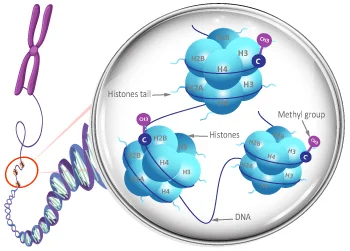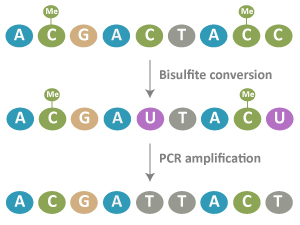
Logout
If you want to log out click in LogOut


DNA methylation forms one of multiple layers of epigenetic regulation. Epigenetic corresponds to the modification of gene expression which do not arise from modifications of the DNA sequence. The most important events are : DNA methylation at CpG islets and post-translational modification of histones (methylation, acetylation, phosphorylation…).
DNA methylation also includes the process of hydroxymethylation, specifically involving cytosine (5hmC). This form of methylation adds another dimension to the intricate world of epigenetics.
Epigenetic events are strongly influenced by environmental factors, stress, and diets.
Exploring these events can help scientists to understand gene regulation, activation of signaling pathways and explain many physiological (like development and growth) or pathological processes.


There are several methods and tools to detect and quantify methylated DNA. Most of them are based on bisulfite treatment of DNA. This treatment deaminate cytosine into uracil, and then to thymine by PCR amplification. However methylated cytosines (5mC), are resistant to this bisulfite conversion and remain as cytosine in PCR amplification and sequencing reaction. This difference of conversion between methylated and not methylated cytosine, enables the detection and quantification of methylation in specific DNA region.
However, bisulfite-based technology can’t distinguish between methyl cytosine (5mC) and hydroxymethyl cytosine (5hmC), for this purpose we developed special protocol for specific quantification of the hydroxymethyl cytosine quantification.
AnyGenes team has more than 15 years of experience in analysing epigenetic using different tools.
Discover other related products: